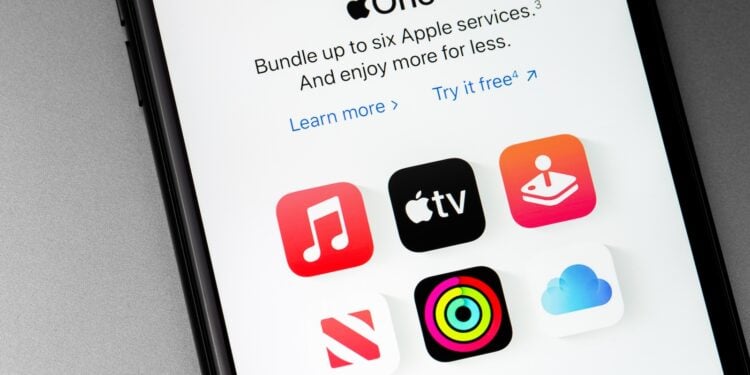Apple has reached a new milestone. For the first time in the company's history, the technology giant's services business is said to have generated annual revenue of more than $100 billion. According to estimates by analysts at Visible Alpha, revenue from the services division is approximately $108.6 billion – an increase of approximately 13 percent compared to the previous year. These figures illustrate how Apple is reducing its dependence on hardware sales and increasingly transforming itself into a services giant.
Apple's transformation from a pure hardware manufacturer to a comprehensive technology and services company is no coincidence. While the iPhone, Mac, and iPad remain important revenue generators, the company's focus is increasingly on digital services. iCloud, Apple Music, Apple TV, Apple Arcade, Apple Pay, and the App Store form an ecosystem that retains users long-term and generates recurring revenue. This model has become a key growth driver for Apple – with impressive profitability.
Growth through services
According to a Financial Times report and estimates from Visible Alpha, Apple's services business generated revenue of $108.6 billion last fiscal year. If this forecast holds true, Apple's services division would be larger than the combined annual revenue of Disney or Tesla.
JPMorgan estimates that services now account for about a quarter of Apple's total revenue, but contribute up to 50 percent of its profits. This is due to the high margins of digital offerings, which are significantly more profitable than hardware production.
The services business includes all revenue from the App Store, the iCloud cloud platform, streaming services such as Apple Music and Apple TV, the Apple Arcade gaming subscription, the AppleCare insurance and support service, and the Apple Pay payment service. The multi-billion dollar contract with Google, which makes Google the default search engine on Apple devices, also makes a significant contribution. This deal generates several billion dollars for Apple annually and is considered one of the most profitable partnerships in the technology business.
Legal and regulatory challenges
Despite its success, pressure on Apple is growing. In the US, the company is facing antitrust proceedings from the Department of Justice targeting the App Store and its fee structure. In Europe, new regulations are taking effect that aim to limit the current standard App Store fees of up to 30 percent on digital purchases. These regulatory measures could have a long-term impact on Apple's revenue from the services sector.
So far, however, the company appears unfazed. Analysts expect the share of services in the overall business to continue to grow. Apple has invested heavily in new content and areas in recent years to secure and diversify growth.
Expansion into new business areas
One example of Apple's expansion strategy is its entry into live sports. The company recently signed a $700 million deal to broadcast Formula 1 races in the U.S. Such projects are intended to expand Apple TV's offerings and make the service more attractive to new subscribers.
The integration of sports rights into the streaming portfolio is part of a long-term strategy to further broaden the services business. Apple is thus increasingly positioning itself as a provider of content, services, and digital experiences – rather than as a pure device manufacturer.
Outlook until 2030
According to calculations by Visible Alpha, Apple's services could account for over 30 percent of total revenue by the end of the decade. Revenue from this division could then rise to around $175 billion. By comparison, analysts expect total revenue of approximately $415 billion for fiscal year 2025. Around half of this will continue to come from the iPhone business, whose sales are expected to grow slightly by around four percent.
This demonstrates that while Apple remains heavily dependent on the iPhone, it is increasingly relying on stable, predictable revenue from services. The mix of subscription models, digital services, and partnerships creates a solid foundation for further growth—even in a saturated smartphone market.
Services as the foundation of Apple's future
Apple's success with its services business underscores the importance of a clear strategic direction. With estimated annual revenue of over $100 billion, the services division is becoming a key pillar of the company. Despite growing regulatory risks, Apple remains on track for success thanks to its closed ecosystem, strong brand loyalty, and broad range of services.
This development demonstrates that Apple's future lies not solely in new devices, but in a constantly expanding network of digital services. This not only creates stable revenues, but also a business model that is less vulnerable to market fluctuations in the long term—a decisive advantage in an increasingly digitalized world. (Image: Shutterstock / Primakov)
- Threads introduces ghost posts – posts that disappear
- WhatsApp introduces new storage management for individual chats
- EU criticizes Meta and TikTok for lack of child protection
- Apple remains strong: JP Morgan now sees price target at $290
- Apple held an exclusive Vision Pro event for developers
- Swift SDK: Android support marks a turning point for Apple
- Apple significantly expands AirPods production in India
- iOS 26.1 introduces stable photo backups for third-party apps
- Apple in leak trial: Fanboy seeks out-of-court solution
- M5 MacBook Pro teardown: top performance, repair flop
- Apple surprises with strong growth in Mac sales
- Apple accelerates US production for its own AI servers
- Vimeo expands 3D support for Apple Vision Pro
- Is Apple withdrawing app tracking protection due to EU pressure?
- Future iPhone could have greater NFC range
- iPhone Air: Production drops drastically after sales slump
- Apple stock in focus: Wells Fargo raises target to $290
- Apple Vision Pro not eligible for trade-in, according to Apple
- Apple is working on a tool for app data migration to Android
- iPhone Air weakens – Apple relies on other models





